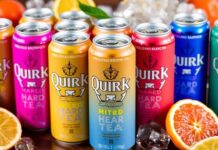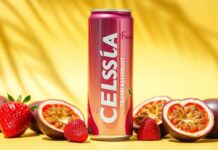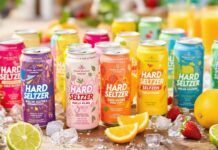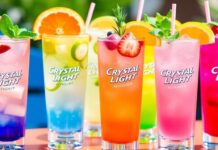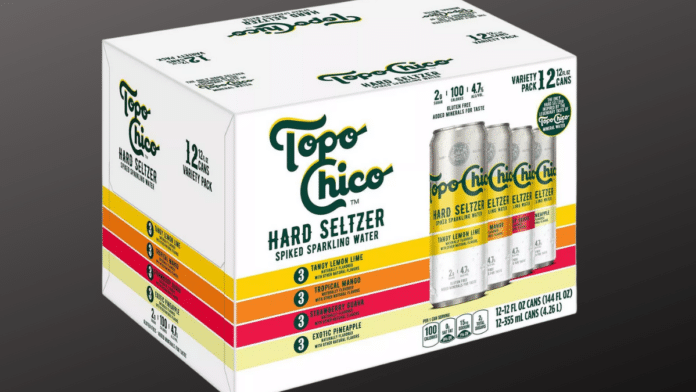Topo Chico hard seltzer will soon launch in US markets, following its successful debut in European and Latin American markets. The entry from The Coca-Cola Company (NYSE: KO) will be distributed in the US by Molson-Coors (NYSE: TAP), in an unlikely partnership borne out of the pandemic.
Initial flavors in the US include Tangy Lemon Lime, Tropical Mango, Strawberry Guava, and Exotic Pineapple. This builds on the brand’s learnings in other markets, including Latin America, where all but the mango variety were launched. In Europe, Topo Chico was launched with flavors of Tangy Lemon Lime, Tropical Mango and Cherry Acai.
Variety packs of three of each will arrive in 12 packs of slim cans, each containing 12 ounces. The products come in at 4.7% ABV, 100 calories, and 2 grams of sugar. Outer packaging points out that it’s “The only hard seltzer inspired by the legendary taste of Topo Chico Mineral Water.”
Sales Team Ramping Up
Topo Chico field sales and marketing positions will be filled in key markets such as New York, Chicago, Denver, Austin, and San Franscisco. Managed by the Greenhouse Agency, these positions will either focus on big box retail account development or on-premise accounts.
The on-premise account manager, which can be found on the Greenhouse careers page, require that “the ideal candidate will have credibility in the Alcohol-Beverage industry and develop account relationships to drive velocity through engagement, brand advocacy, and brand education with consumers, trade, and the bottler(s).”
Greenhouse is an agency that works with brands such as Truly, Jack Daniel’s, Titos Vodka, and Reed’s Ginger Beer, to name a few. The outsourced field marketing services provided by the company allow rapid scale in multiple markets. In Coca-Cola’s case, they provide an arm’s length transaction that brings experience perhaps not available among current staff in certain markets.
Mixed Successes in Latin America
Topo Chico hard seltzer appears ready to launch in Colombia this week, after having launched in Brazil, Costa Rica, and Mexico last fall. São Paulo and Rio de Janeiro and Mexico City were the first Latin American markets to receive the new product. Three flavors were part of the initial release. Strawberry-Guava, Lima-Lemon and Pineapple varieties are all gluten-free, 90 calories per 310 ml can (about 10.5 ounces) and 4.7% ABV.
Coca-Cola FEMSA (NYSE: KOF), based in Mexico City, is the world’s largest franchise bottler of the The Coca-Cola Company. In the company’s most recent earnings call, February 27, 2021, Coca-Cola FEMSA CEO Constantino Spas pointed to Brazil and Costa Rico for the biggest successes to date.
“Coca-Cola has a history of building brands known worldwide for innovative flavors, creative strategies and exemplary execution at the point of sale In line with the popularity of Topo Chico in markets such as Mexico and the United States, this new product will present the brand and its legacy for even more people,” –Roberto Mercade, president of the North region of Latin America.
The brand has apparently met or exceeded expectations in South American large cities. “However, in the case of Mexico, we’re seeing a much more competitive market than we expected,” said Constantino. “We have seen brewers enter the market very quickly with different offerings and some other international and local players.”
After Colombia, Argentina and Uruguay markets will be activated. The challenge has come from the lower sweetness of Topo Chico, when compared to ingrained RTD brands in the Mexican market. Learnings in parts of the Latin American launch can be translated to US markets. “I think that this is the first step into a very robust design of portfolio going forward,” concluded Constantino.
Challenges of the US System
Selling alcoholic beverages in the US has unique challenges, due to the three-tier system that dates back to prohibition. To help accelerate its go-to-market strategy for hard seltzer, Coke turned to Molson-Coors. Distribution through the brewer’s well-established channels and infrastructure solves the pesky (and slow, expensive) problem of permits and licenses in states with disparate laws.
The pricing strategy in Latin America will likely translate to the US market, in spite of the additional taxes and layers of touch. As Constantino explained in the Q4 earnings call, the goal has been to supplant beer occasions, so pricing has been held at the level of premium beers, not approaching the price of RTDs from spirits companies. “I would say it’s a long journey because you need to establish a very different liquid profile and a very different value proposition, much more refreshing.”
Emerging Stronger
James Quincey, CEO of The Coca-Cola Company, recently provided an update on its “Emerging Stronger” strategy for battling the impacts of the global pandemic. “We got sequential improvement in the business as we went through 2020,” Quincey said in the presentation. The goal is to reach pre-COVID levels well ahead of the broader economy’s timeline.
The portfolio has been optimized to focus on brands with the most potential and to remove the weakest ones. In that respect, the “pandemic has served as a catalyst” for improvement.
Products such as Topo Chico are “in line with our with our approach to test and learn so that we continue to become ever more consumer and customer centric,” said Quincey. The brand, however, is handled very differently in the US.
“It’s important here to remember how different the U.S. is versus the rest of the international market because of U.S alcohol market regulations,” said Quincey in KO’s Q4 earnings call on February 10, 2021. “Topo Chico Hard Seltzer will not be going through the company stroke the bottling system in the U.S., it will be handed all by our collaboration with the Molson Coors team.”
Quincey reiterated that the Topo Chico marketing efforts in the US, as a result of the Molson Coors collaboration, will not be “competing, in any way shape, or form, as a priority with all the other things that are going on that are all obviously being done by ourselves and the bottlers in the U.S.”
“And I think, most of us are very excited about the opportunity in the U.S.,” Quincey added.
- ThirstyFrog Sets Sail - September 7, 2022
- Tell Me Whey: Dairy Hard Seltzer Developed by Cornell Scientist - July 24, 2022
- Constellation Brands Expected to Announce Significant Quarterly Increase in Sales - September 27, 2021


